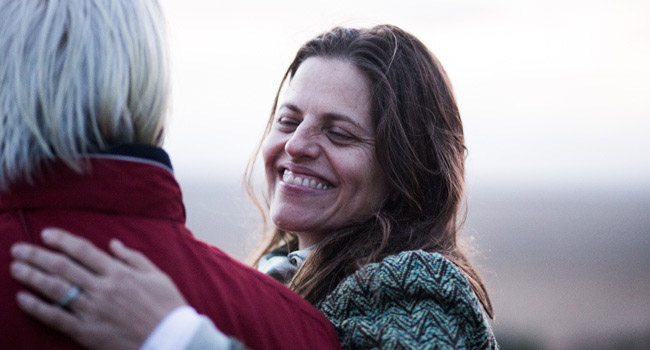
Dominique Botha with chinese poet Duo Duo Photo: Retha Ferguson
Dancing in Other Words Poetry Festival, 10 May 2014, Spier, Stellenbosch.
Dominique is an acclaimed poet, author and translator. I start off by asking her what inspired her to be a writer/poet, or in her words, what “hurt her into poetry”. “Overshadowed” by her charismatic, deceased, older brother, Paul, and aware that few things grow in the shade, she felt a “compulsion” to write, that is, to act as someone who “curates” experience into words, what writers do, according to Dominique, from a young age. On the topic of lyricism and poetry in her writings, she answers that writers generally have a “Eureka” moment when others point out that they have found their voice. Since writing is essentially a “cutting away” in service of authenticity, quite a paradox, then lyricism is for Dominique a natural progression or inherent quality of her writing to begin with. It is something she values highly in the writing of others, too.
When quizzed about her travel writing, she tells me that “all writing is a journey”, and that being a poet is not a “vocation”, but rather a “vehicle”, a “mode of transport” that allows for deep forms of exploration. One is thus able, through writing, to travel anywhere in your mind. Her key moments of inspiration have come from the places of “love” and “death”, and from “other people’s writing”. The Afrikaans etymological dictionary, furthermore, has helped to inspire her work.
Crucially, Dominique tells me that she finds poetry everywhere, in her everyday existence, and that she constantly “collects” “phosphorescent” fragments, fragments that are put together in writing for the illumination of an (illusionary) whole. Her writing of poetry is against a form of concealment, and she “writes in the light”. Regarding the “unsayable” in her writing, she responds that “the text is only the tip of the iceberg”, and that “omission” is ultimately just as important as that which is made explicit, since one can never fully translate lived experience as an unmediated whole onto the page in the writing process. Dominique, when asked about the fact that she translated her own Afrikaans work, Valsrivier, into the English False River, notes that “writing itself is an act of translation”, that she engaged in an “archaeology” of experience when laying down the material for the memoir/novel in Afrikaans.
On the topic of this year’s Dancing in Other Words festival, Dominique tells me that “poetry has no class, no race, no age”, and that it has been most rewarding for her to connect with poets whose work she had known before – such as Henning Pieterse – while discovering the work of poets such as Homero Aridjis and Hans van de Waarsenburg. Dancing in Other Words, is “definitely utopian”, yet equally, it is “definitely essential”. “Utopia is the guiding dream” and “dreaming is our most important job”.
 SLiPStellenbosch Literary Project
SLiPStellenbosch Literary Project 